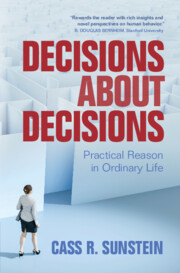Book contents
- Decisions about Decisions
- Decisions about Decisions
- Copyright page
- Contents
- Tables
- Preface
- 1 Second-Order Decisions
- 2 Deciding to Opt
- 3 Deciding to Know
- 4 Deciding to Believe, 1
- 5 Deciding to Believe, 2
- 6 Deciding Inconsistently
- 7 Deciding to Consume, 1
- 8 Deciding to Consume, 2
- 9 Deciding by Algorithm
- 10 Deciding for Oneself
- Epilogue “Get Drunk!”
- Acknowledgments
- Index
4 - Deciding to Believe, 1
The Case of Climate Change
Published online by Cambridge University Press: 29 June 2023
- Decisions about Decisions
- Decisions about Decisions
- Copyright page
- Contents
- Tables
- Preface
- 1 Second-Order Decisions
- 2 Deciding to Opt
- 3 Deciding to Know
- 4 Deciding to Believe, 1
- 5 Deciding to Believe, 2
- 6 Deciding Inconsistently
- 7 Deciding to Consume, 1
- 8 Deciding to Consume, 2
- 9 Deciding by Algorithm
- 10 Deciding for Oneself
- Epilogue “Get Drunk!”
- Acknowledgments
- Index
Summary
People are frequently exposed to competing evidence about climate change. We examined how new information alters people’s beliefs. We find that people who doubt that man-made climate change is occurring, and who do not favor an international agreement to reduce greenhouse gas emissions, show a form of asymmetrical updating: They change their beliefs in response to unexpected good news (suggesting that average temperature rise is likely to be less than previously thought) and fail to change their beliefs in response to unexpected bad news (suggesting that average temperature rise is likely to be greater than previously thought). By contrast, people who strongly believe that man-made climate change is occurring, and who favor an international agreement, show the opposite asymmetry: They change their beliefs far more in response to unexpected bad news (suggesting that average temperature rise is likely to be greater than previously thought) than in response to unexpected good news (suggesting that average temperature rise is likely to be smaller than previously thought). The results suggest that exposure to varied scientific evidence about climate change may increase polarization within a population due to asymmetrical updating. The implications of these findings are explored for how people will update their beliefs upon receiving new evidence about climate change, and also for other beliefs.
- Type
- Chapter
- Information
- Decisions about DecisionsPractical Reason in Ordinary Life, pp. 64 - 80Publisher: Cambridge University PressPrint publication year: 2023

